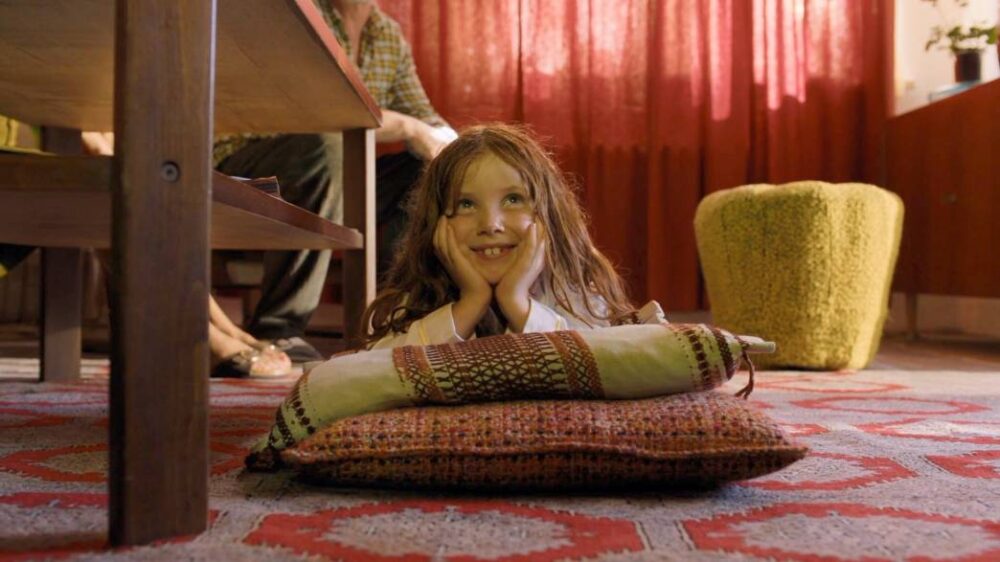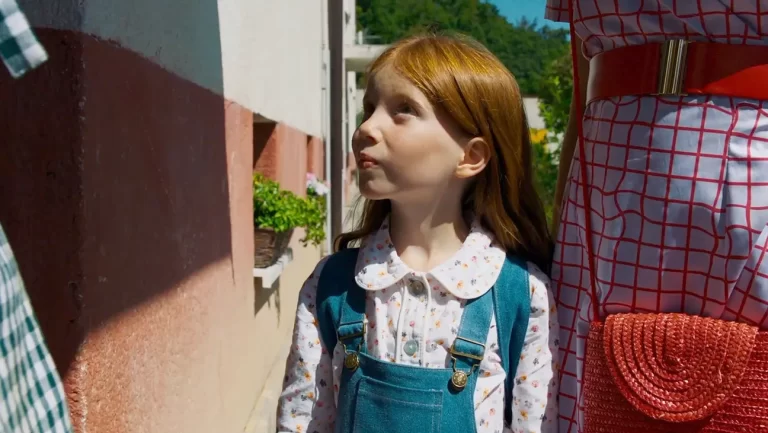The opening scene establishes this dynamic beautifully. Amálka presses her ear to a door, straining to catch words exchanged in hushed but heated tones. She hears her grandmother dismissing her mother’s pursuit of happiness as a fairy tale, but the meaning eludes her. Rather than reacting with sadness or concern, she plays with the family cat, clutches a children’s book, and opens the door to the room where the adults are talking. Asked to return to her room, Amálka matter-of-factly states, “I’m bored.” This moment sets the tone for the film—she exists within her own little world, even as that world is on the verge of change.
More SBIFF Coverage: ‘A Missing Part’ is a Heartbreaking Story of a Father’s Love in a Foreign Land
A Thoughtfully Crafted Perspective Portrays the Weight of Unspoken Tensions
Parkanová’s approach to storytelling is immersive, keeping the camera at Amálka’s eye level and presenting the narrative as she experiences it. The cinematography by Tomáš Juríček enhances this, using rich, saturated colors that make each moment feel like a vivid childhood memory. The visuals are striking—warm tones of sun-drenched fields contrast with the cooler hues of her home, reflecting the comfort she finds in nature versus the unease of her domestic life.
Bankó’s performance is remarkable. She embodies Amálka with an effortless mix of curiosity, mischief, and quiet contemplation. There’s a naturalism to her acting that makes her feel like a real child rather than a scripted character. She doesn’t over-explain or react in ways that feel staged. Instead, she simply exists within the frame, absorbing the world around her.
The core of “Tiny Lights” revolves around the strained relationship between Amálka’s mother (Elizaveta Maximová) and grandmother (Veronika Žilková). The tension between them is palpable, yet Parkanová never directly exposed Amálka to it. Instead, the young girl catches glimpses—a sharp remark from her grandmother, her mother’s quiet frustration, the way conversations shift when she enters a room.
These small moments build a sense of unease. Amálka loves both women, but she senses the discord. A telling scene shows her playing with other kids her age, as she mutters to herself, “Mummy, Granny, Mummy, Granny,” as if trying to balance their presence in her life. Meanwhile, her grandparents’ attempts to distract her—taking her swimming, picking blueberries—feel like a quiet effort to maintain normalcy, even as things unravel around them.

A Double-Edged Strength
Parkanová excels in capturing the innocence of childhood, but this strength is also where “Tiny Lights” stumbles. By committing so fully to Amálka’s perspective, the movie risks feeling too clinical, and thus emotionally distant. The lack of a clear adult lens means the story unfolds without the emotional framing that might give weight to the family’s conflict. While this detachment mirrors how a child would experience such events—uncertain, floating between moments—it can also leave the audience grasping for something deeper.
The film also flirts with artifice. Abstract inserts—shot on what looks like Super 8 film—add a dreamlike quality but don’t always feel essential. They hint at deeper themes but remain just that: hints. Similarly, the pacing, though deliberate, sometimes meanders. At just under 80 minutes, it’s a short film, yet some sequences stretch longer than necessary, making the emotional core feel thinner than it should.
More SBIFF Coverage: ‘To Kill A Wolf’: A Haunting and Atmospheric Tale of Trust, Trauma, and Redemption
‘Tiny Lights’: A Fractured Family as Seen (and Overheard) by a Child
Despite its occasional detachment, “Tiny Lights” is an evocative, beautifully crafted film. Parkanová understands childhood—its small joys, quiet fears, and its way of absorbing the world without fully grasping it. The film’s greatest achievement is how it places us in Amálka’s shoes, making us feel the uncertainty she doesn’t yet have words for.
While the film’s commitment to perspective is impressive, it also limits how deeply it resonates. The absence of a more defined adult viewpoint makes the family’s unraveling feel observed rather than felt. Still, there’s something haunting about watching a child sense the shift in her world, even if she doesn’t yet understand why.
Ultimately, this delicate film demands patience, and its minimalism can be frustrating for those looking for a more traditional narrative. But for those willing to sit with its quiet moments, it offers a visually stunning meditation on the things children see and hear—long before they fully understand them.

“Tiny Lights” screened in the “Eastern European Cinema” section at this year’s Santa Barbara International Film Festival (SBIFF). The festival ran from February 4 to 15, 2025. Follow us for more coverage.



